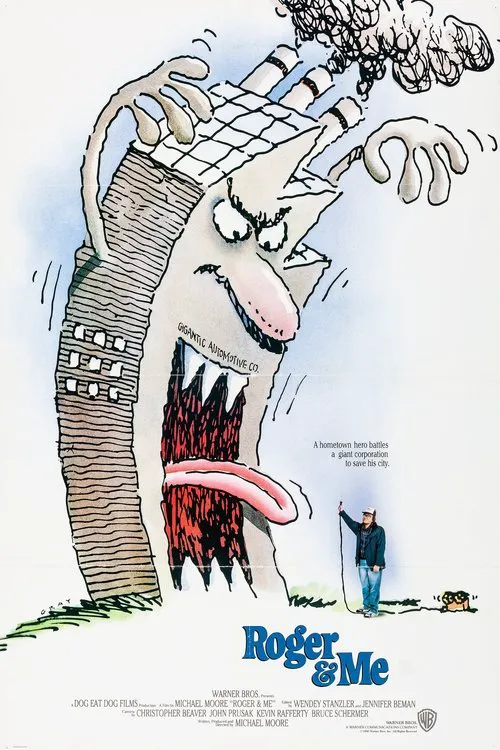Roger & Me

Plot
Roger & Me, a documentary directed by Michael Moore, is a poignant and powerful exploration of the devastating consequences of corporate disinvestment and the struggles of a community left in its wake. The film's central premise revolves around the closure of General Motors' (GM) massive assembly plant in Flint, Michigan, in 1987. This pivotal event led to the loss of over 30,000 jobs, forever altering the economic and social landscape of the city. Through a series of interviews with the plant's former employees, residents of Flint, and high-ranking GM officials, Moore sets out to examine the impact of this catastrophic event and shed light on the motivations behind the company's decision. Moore's personal vendetta, however, lies in his desire to gain an interview with Roger Smith, the then-CEO of General Motors. This pursuit drives the narrative of the film, as Moore traverses the United States and Canada, often employing unconventional methods to get to Smith. The filmmaker's obsession with Smith stems from his perception of the CEO's disconnect from the very community that was being ravaged by GM's economic decisions. Moore hopes to expose the truth behind the closure of the Flint plant and to hold those responsible accountable. Through interviews with residents of Flint, the documentary paints a picture of a city grappling with the aftermath of the plant's closure. The once-thriving community is now plagued by despair, poverty, and a sense of hopelessness. The film showcases the economic devastation that resulted from the loss of jobs, as well as the social consequences that followed, including the disintegration of families, the decline of civic institutions, and the erosion of social cohesion. Moore's interviews with the former employees paint a picture of a workforce that was not only abruptly laid off but also abandoned by the very company that had once been their lifeblood. The workers' stories are marked by a deep sense of betrayal and frustration, as they struggle to comprehend why GM would choose to abandon the very community that had given it so much. The film also delves into the complexities of labor relations and the challenges faced by workers in dealing with union leadership and the constraints imposed by collective bargaining arrangements. One of the most striking aspects of the documentary is its juxtaposition of the grim realities faced by the residents of Flint with the opulence and extravagance of the American corporate elite. Moore's critiques of Roger Smith and General Motors extend beyond the corporation's actions in Flint, painting a broader picture of a society in which profit is prioritized above all else, including the welfare of workers and the communities in which they live. Through his biting commentary, Moore suggests that the closure of the Flint plant was not simply a matter of economic necessity but rather a symptom of a larger societal problem. The documentary also examines the response of local and state authorities to the crisis, exposing the often-ineffective and sometimes even complicit actions of policymakers. The film portrays a scenario in which officials prioritized the interests of corporate elites over those of the working-class residents of Flint, further exacerbating the city's economic woes. Throughout the film, Moore's pursuit of Roger Smith serves as both a personal and professional obsession, driving him to push the boundaries of journalistic endeavor. His creative attempts to secure an interview provide some of the film's most compelling moments, as Moore resorts to a series of audacious and often humorous stunts to get his message across. Despite never achieving his goal of securing a direct interview, Moore's persistence and determination make for a riveting narrative thread. In conclusion, Roger & Me is a masterful documentary that provides a powerful commentary on the human cost of corporate disinvestment and the failures of a society that prioritizes profit above all else. Through Michael Moore's engaging and empathetic narrative, the film offers a poignant tribute to the resilience and struggles of the people of Flint, while also serving as a scathing critique of the American corporate elite. The documentary's continued relevance underscores the enduring need for honest, unflinching commentary on the complexities of capitalism and the human cost of economic decisions.
Reviews
Recommendations




